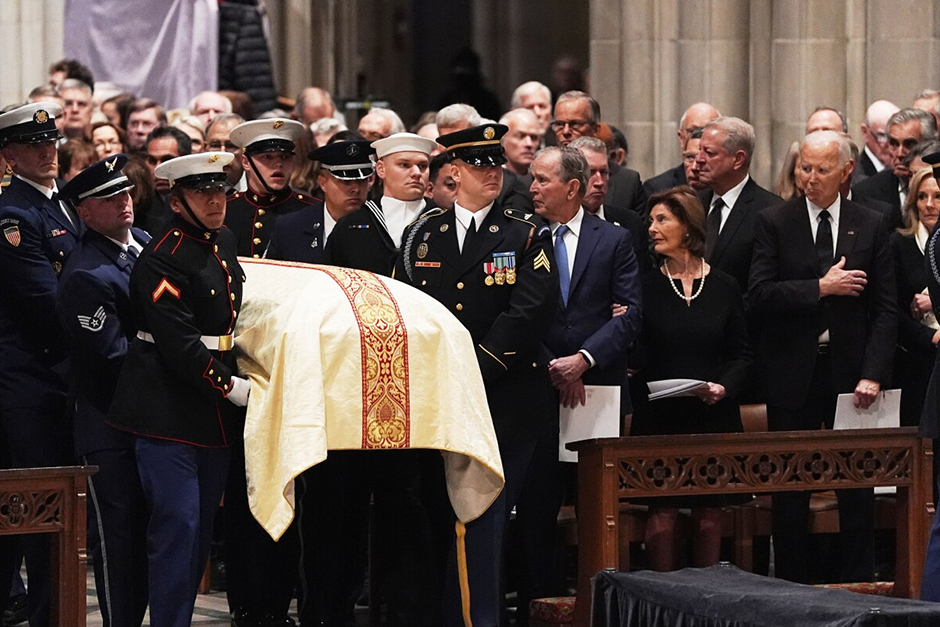In the solemn quiet of a nation saying farewell, a striking tableau unfolded. The funeral of former Vice President Dick Cheney became a gathering point for a pantheon of American political figures: two former Presidents Bush, a significant contingent of Republicans, and, perhaps more surprisingly, a notable presence of Democrats. Yet, one figure, larger-than-life in the current political landscape, was conspicuously absent: Donald Trump. The imagery spoke volumes, painting a vivid picture of enduring traditions, shifting loyalties, and the stark divisions that define an era.
The Echo of a Different Era
The scene itself felt like a momentary rewind, a glimpse into a political epoch that often feels distant. The presence of George W. Bush, alongside other Republican stalwarts, was expected. Cheney was, after all, a linchpin of their administration, a figure of immense influence and conservative conviction. What truly resonated was the attendance of Democrats – leaders and former officials who, in their active careers, often found themselves in fierce ideological combat with Cheney and his policies.
This convergence wasn’t an act of political alliance, but a demonstration of a shared, if sometimes strained, understanding of institutional respect. In Washington, even the most bitter political adversaries often observe certain rituals, recognizing the shared burden of public service and the finality of passing. It’s a nod to a collective history, a quiet acknowledgment that despite the battles, there’s a foundation of shared American identity. “It’s a reminder,” as one longtime D.C. observer quipped, “that before you’re a Democrat or a Republican, you’re part of a club with very old rules. You show up for the big goodbyes, even if you spent a career trying to undo their legacy.” This unspoken code suggests that some bonds, forged by the very act of governing, transcend immediate partisan lines, at least for a day.
The Elephant Not in the Room
Against this backdrop of traditional civility, Trump’s absence loomed large. His decision not to attend wasn’t just a scheduling conflict; it was a deliberate statement, entirely consistent with his political brand. Trump famously disrupted many unwritten rules of political decorum, and his relationship with the establishment wing of the Republican party, particularly the Bush dynasty, has been openly hostile for years. He has rarely shied away from using such moments to draw a sharp contrast between himself and what he often terms the “establishment.”
His absence at Cheney’s funeral underscored his continuing role as an outsider, even as a former president and current frontrunner for the Republican nomination. It reinforced his narrative that he belongs to a different kind of political order, one that doesn’t necessarily subscribe to the old rituals of bipartisan respect or historical deference. For many of his supporters, this choice would likely be seen not as a slight, but as another defiant act against a political class he has vowed to dismantle. It’s a powerful symbol of the ongoing transformation of the Republican party and the stark divide between its traditional figures and its current populist standard-bearer.
A Shifting Landscape of Respect and Rifts
The image of Democrats and establishment Republicans gathering in solemn remembrance, while a towering figure from a new political guard remained apart, offers a poignant snapshot of American politics today. It highlights a persistent tension: the enduring desire for some measure of national unity and institutional reverence versus the accelerating forces of polarization and political tribalism. Whether this moment represents a fleeting glimpse of a bygone era or merely a temporary pause in the ongoing political slugfest remains to be seen. But for a brief period, the attendance – and the absence – at a single funeral offered a profound reflection on who we are, and who we are becoming, as a political nation.
The very fabric of political respect and the rituals that underpin it are clearly under review, challenged by a new wave of political leadership that redefines engagement. The funeral of Dick Cheney, in its quiet dignity, inadvertently became a stage for a much louder debate about the future of American political culture.




